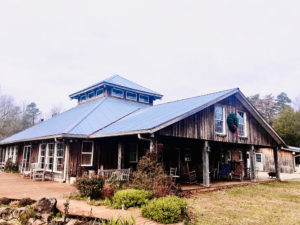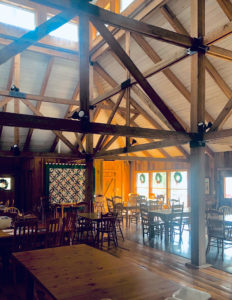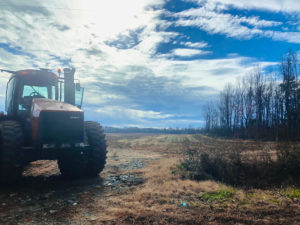Goat Lady Dairy is a crown jewel for artisanal cheese making, proudly living in the back roads of North Carolina’s Randolph County where it has survived for the last 200 years. The burgeoning community surrounding it, English settlers who landed only two miles from the current goat farms, established families whose kinfolk prosper to the present day. Names like the Bradd’s, the Brooks, the Linberg’s, and the Routh’s whose bloodlines have been sowed into these very lands, never blow too far from home and keep proud traditions in the family.


On the sequestered roads stretching across the wide open plains, past the many horse and cow farms hugging Liberty Street, Ginnie Tate must have felt the same homey calmness that I did when she first arrived. When she came to the abandoned tobacco farm atop of the sloping greens, she saw opportunity few others did and bought the thing for cheap, converting it into a family run goat cheese dairy. Her two pet Nubian goats she kept close earned her the nickname, by some questioning neighbors, “the Goat Lady.” The goats matured enough to produce milk and she used the excess to turn into cheese. Her brother Steve and other family jumped on board to start one of NC’s first licensed goat cheese dairies. The Tate’s were only able to keep it running for so long, however. It wasn’t until one of their dish washers, a hard working 18 year old practically raised on the farm, matured into her own, rising above the rest to oversee all operations, catalyzed Goat Lady Dairies meteoric rise. Carrie Routh has made it her life’s mission to preserve the traditions passed down to her from Steven Tate, a man who valued her so much, “He is exactly the kind of person you’d be happy to work for; calm, considerate, and always right there to do the job with you.” Carrie was asked by Steve to take his place in running the farm, and inherited the run-down outhouses, 40 acres of land, and a little blue house Steve and Ginnie lived in. She received grants to expand the farm’s operations, few banks wanted to get involved in because of the protected lands that back up into the property. The newly renovated structure, built of logs found on the land, and compostable materials, was hand put together by Carrie’s husband Bobby, a skilled contractor. Custom made cleaning and aging equipment, several newly installed rinding chambers, and enormous acid vats, along with Carrie and Bobby’s business savvy, streamlined their production to turn them into a national cheese treasure. The dream of spreading passion-infused food products went beyond local neighbors to big retailers such as Wegmans, Harris Teeters, and Whole Foods, as well as many restaurants and farmers markets.


Their goat and milk cheeses have collected many awards along the years, each with their own expressive and vibrant flavors. Every cheese: Providence, Lindale, Sandy Creek, Snow Camp, Fig & Honey, Smokey Mountain Round, and the many assortments of fresh chèvre each stand on their own as powerful, complex, and mouth watering bites that inspire gourmet dishes of many kinds. Each cheese is cared for throughout the entire process. Each one is kept in their particular rinding and molding chamber at set temperatures and humidity levels and are not ready for packaging until the’ve aged at least one year. Carrie and Bobby put as much care into their cheese making as they do in taking care of their workers including the land they’ve built on. Their relationship to the land is almost personal and so much respect and gratitude is felt in Carrie’s words on their responsibility as farmers, “… we have to respect the earth. Me and my husband try to be stewards of the land, taking care of our animals and try to make environmentally friendly decisions wherever possible.” Carrie worries about the impact humans are having on the earth who feels there should be something urgently done about it. When asked about how it might affect their business, Carrie wasn’t concerned as their facilities have lasted many hurricanes, and believes they’ve built something that will last many years beyond them.

Carrie’s father, a historian buff, was suspicious of the old log house at the bottom of the hill who actually dated it to about 1780. Later, Carrie dove into her family ancestry, discovering that one of her great Routh relatives, was a Methodist priest right next to the farm dating back to around that same time the log house was built. Carrie has reason to believe this priest built the little blue house, who always felt a deep sense of belonging when she first stepped foot in it all those years ago. Something brought Carrie back to the lands her ancestors were raised on, coming full circle to recover what is rightfully hers. What used to be the humble abode of the Tate’s, and the many families before her, built by the hands of her ancient bloodline, has returned today as the quiet home of Carrie and Bobby, the little blue house at the bottom of the hill.
Written by: Zachary Stern
